Teaching Final Paper
- 1. Why I Teach 1 Why I teach: A biblical philosophy of education Brooke Wilbanks Covenant College
- 2. Why I Teach 2 Growing up, I saw education as something I had to do. I went to school and studied hard for all the wrong intentions. I was a very good student and received straight A’s, yet learning did not mean much to me. I saw education as something that was forced upon me. I studied because it was expected of me. When I did study, it was only to pass the test and make my parents proud. However, after reading the book Teaching Redemptively by Donovan Graham and exploring a variety of different sources in my introduction to teaching class, my view of education has changed significantly as I have found that education actually encompasses so much more than I had previously thought. Over the course of this semester, I have been able to acquire a much better understanding of what biblical education looks like and what it should be. Throughout this paper, it is my goal to share and describe my biblical philosophy of education in much detail. I believe that in order to understand the biblical philosophy of education, one must start by recognizing the nature of learner. Christ has made the world and all things in it. Therefore, the nature of the learner contains the wisdom of God (Graham, 2003). Students are made in God’s image. There is specific evidence of this in Genesis 1:20 which states, “so God created man in his own image, in the image of God he created him; male and female he created them” (NIV). God created man and woman to worship him through dominion in the world. God has allowed all people to learn from his creation. The knowledge he has given should be returned to him as we give him glory and praise. Although God has made all people in his image, it is essential to remember that we are also fallen human beings. The fall has affected all of creation. Therefore, learning has become corrupt at times. But, thanks be to God that, “…redemption in Jesus Christ reaches just as far as the fall” (Wolters, 1985). Childhood is a time of many changes and new experiences. Each individual is made up of many feelings and emotions and will act according to how they feel.
- 3. Why I Teach 3 Learning is a tough process which involves exciting findings, but also difficult struggles. Still, God has made students to be rational, creative, moral, free and responsible, and faithful so that he can use each individual in His world as they continue to learn and grow in knowledge (Graham, 2003). Just as Christ works in the learner, it is also important to note that biblical education also rests on the shoulders of the teacher. As a teacher, Jesus must be the model of how to live. A teacher’s relationship with God should be manifest in our relationship with others. Teachers must teach with confidence but also in submission to God and his Word (Graham, 2003). Teachers have a lot of responsibility and are even warned in James 3:1 which says, “not many of you should presume to be teachers, my brothers, because you know that we who teach will be judged more strictly” (NIV). Teaching is a calling from God and we will be held accountable to him when we stand before the judgment seat one day. Therefore, although teachers have the amazing opportunity to mold the minds of young children, they also have much responsibility in what they teach and the way they teach it. In order to teach with a biblical philosophy, a teacher must possess the characteristics of a prophet, a priest, and a king. A teacher must function as a prophet by knowing, interpreting, and speaking the truth with biblical authority. The key is to know the Bible and meditate on Christ’s promises day and night. In Joshua 1:8, the Lord says, “do not let this Book of the Law depart from your mouth; meditate on it day and night, so that you maybe careful to do everything written in it. Then you will be prosperous and successful” (NIV). Knowing the Word of God “requires a personal relationship to Jesus Christ, a relationship that embodies all of life, every moment, every aspect” (Steensma, 1977, p.5). In addition, teaching as a priest requires the teacher to be an intercessor. Because of Christ, it is possible for teachers to restore students as
- 4. Why I Teach 4 well as colleagues through prayer, compassion, healing, and comfort. To teach as a king means to teach with authority. Teachers are to be stewards of God and are to lead in righteousness and creativity. The goal of a teacher should be to bring “shalom” (peace and wholeness) to the students by justly serving them in word and deed (Graham, 2003, p.137-140). Now that the nature of the learner and teacher have been described, it is possible to describe what the purpose of biblical education is. Sadly, I believe the purpose of education has been distorted throughout the years. Many individuals are now interested in pursuing a profession in teaching because of personal reasons, social reasons, and political reasons, and especially economic reasons. Even teachers in Christian schools are flawed if their idea of education contains keeping the students from evil influences, segregation, and overemphasizing excellence. Therefore, it is no surprise that “…more and more teachers are leaving the profession after only a few years in the school setting” (Block, 2008, p.416). These answers to the question “why teach?” fall short of the purpose that God intends for teachers. I feel that it is essential for teachers to give up selfish desires and instead focus on the student who needs to be lead and taught by the truth of God. Teachers should teach because they love God with all their heart and, because of that love, will extend it to others (Matthew 22:37-39, NIV). I greatly agree with Graham’s view that “the task of true education is to develop knowledge of God and His created reality and to use that knowledge in exercising a creative- redemptive dominion over the world in which we live. Such an outcome can only be obtained by loving God and communing with Him, resulting in the wholehearted worship of God” (Graham, 2003, p.57). A profession is a calling from God. Since teachers spend so much time in the school system, it is essential they make a difference in that environment. Education is important to advance in life. God has given us intricate minds and we are to fill them with information
- 5. Why I Teach 5 about who God is and what he has created. Through learning, students are able to better understand the world and live out their life for the Lord. By receiving an education, we are able to better pursue our chief end of glorifying God and enjoying him forever. It is important that we do “not become weary in doing good, for at the proper time we will reap a harvest if we do not give up” (Galatians 6:9, NIV). Therefore, one must approach education joyfully and willing to follow the Lord’s will. As important as it is to know the purpose of education, it is also significant to focus on the content and subject matter of education. All truth is God’s truth because of common grace. Therefore, through general revelation, curriculum can expand beyond Christianity. I am very impressed with Sidney Greidnaus’ view of developing a biblical viewpoint. She believes that the materials teachers teach with should be in accordance to biblical teaching and should be used to understand reality. All situations are opportunities for students to learn and grow. Therefore, it is important to find biblical themes, principles, and concepts. The Bible must always be the framework in understanding content and subject matter (Graham, 2003). Subject matter must be connected and explored in the context of the real world. A variety of subject matter must be provided for the students to learn. In addition, teachers are able to use content and subject matter to aide the students in cumulating more knowledge. Through the exploration of the subject, teachers are able to ask questions, allowing the students to think creatively and abstractly. Textbooks and curricular materials are very important and should be used as resources in the classroom to a certain degree. Textbooks are great starters for learning as they teach the students the basic essential information they must master. However, learning must not stop there. It is important to take concepts from the book, but then apply them to the individual’s life. There is so much to learn that it cannot possibly be contained in a simple textbook. Teachers
- 6. Why I Teach 6 then have the privilege and responsibility to use the textbook as a guide while adding to it in order to better enhance the topic being focused upon. Choosing curriculum can be a daunting and tiring task for all teachers, yet it is also very important for the learning process. To teach biblically, curricular materials must be guided by and in accordance to biblical principles and the mission of the school. (Graham, 2003) Therefore, the Bible must be the framework in choosing curriculum. It is essential for a Christian educator to know about God and His Word since it is those truths that transform the lives of the students. Curriculum directs students in the right direction by allowing them to witness the subject in the context of God’s creation. Although the material a teacher uses is to impact the child as they learn more about the environment, it does not have to be written by a Christian. There are a variety of books that allow students to “develop a Christian mind-set and way of life” (Graham, 2003, p.220). Each person has unique strengths and talents. Therefore, Christians can still learn from non-Christians as long as they approach the information in with a godly mindset. Curriculum obviously must contain facts and information for the students to learn, but it also must force the students to ask “so what” and “now what” questions. In fact, curriculum should be integrated. Students should be able to make connections between subjects and experiences (Graham, 2003). Curriculum is only the starting point which is then enhanced by the student’s creativity and curiosity. Once students learn the information expected of them, they should be able to embrace that information and take it to heart. Curriculum must be much more than just coverage of textbook chapters. The curriculum used should stress the importance of knowing what is going on in the world, taking action, and creating the dominion over it that God has called us to.
- 7. Why I Teach 7 Just as curriculum is a significant subtopic in a biblical philosophy of education, pedagogical methods are also essential to pay attention to. Humans are rational beings. We are able to place events in our own framework, formulate ideas, and evaluate perceptions and events (Graham, 2003). God has allowed each unique individual the ability to think and process information in their own way. In fact, every classroom and situation is different because each student is unique. According to Anthony Gregoric (1979), “learning style[s] consists of distinctive behaviors which serve as indicators of how a person learns from and adapts to his environment. It also gives clues as to how a person’s mind operates” (p. 234). There are many different styles of learning. For example, Gregoric classifies learning into four categories including concrete sequential, abstract sequential, concrete random, and abstract random. Additional learning styles have been studied recently as well. According to data, most students are either dynamic learners (35%) or common sense learners (35%). There are still others who are imaginative learners (12%) and analytic learners (18%). Since each individual perceives and orders information differently, it is crucial that a teacher teaches to all styles of learning so that each student can achieve to the best of their ability. The model of teaching styles which has been shown to be most successful over the years is commonly known as Hoag’s ladder. This model describes which ways of learning are most effective in student’s memory of the topic three days after it is taught. A teacher should know how the students learn most effectively and Hoag’s ladder is a great help. Kaufmann (1996) states, “the need to listen actively and constructively is crucial for [students] to succeed in their work” (p.1). At the bottom of the ladder are passive ways of learning. These include hearing and seeing. When students are engaged and actively participate through echoing and reciting, up to 25% of the information is shown to be retained after three days. However, higher order
- 8. Why I Teach 8 thinking skills which include discussing, working on projects, and teaching the lesson enables the students to retain 60% to 95% of the information previously taught (Kaufmann, 1996). Therefore, it is important that teachers use different techniques as they teach their students. Teachers must see each student as part of God’s creation. It is important for the teacher to get to know the students personally in order to best direct them in the way they should go. Teachers not only have the opportunity to teach with a variety of strategies, but they also have the responsibility to manage the classroom. According to Harry Wong (1990), it is the teacher who makes the difference in the classroom. Classroom management is one of the main characteristics of an effective teacher. It is important that the teacher is in control of the class. The teacher should bestow authority among the students. Once the students respect the teacher, the teacher is able to effectively guide and direct the children’s performance. Classroom management is a difficult task, especially when there are a handful of disruptive students present. Since all humans are sinful and no one is perfect, discipline must be experienced in the classroom. In Ephesians 6:4, Paul states, “fathers, do not exasperate your children; instead, bring them up in the training and instruction of the Lord” (NIV). Although Ephesians 6:4 is aimed at fathers, it speaks of the importance of instruction and correction which I believe teachers should take to heart as well. When discipline is approached from a biblical perspective, it actually builds character in the student and has restoration in view. Students should be aware of the rules and expectations that are to be followed. Therefore, it is important that a discipline plan be implemented. Rules should be simple and easy for the students to remember. As a teacher, I hope to never have to scream or yell at my students. Although it is important to be firm, it is just as important to be polite (Wong, 1990).
- 9. Why I Teach 9 The goal of a Christian teacher should be to enable students to focus on finding their value and identity in Jesus Christ, not in rewards or control for the sake of a good appearance. Children should be viewed as fallen image bearers (Graham, 2003, p.259). Teachers should allow their students to be free, creative, moral, and rational. By the grace that has been given through the death and resurrection of Christ Jesus, we are to show grace to others in return. Disciple should not harm students in anyway, but instead should bring them back to the straight and narrow path. We must approach the topic of discipline biblically. Psalm 119:13 which states, “teach me, O Lord, to follow your decrees; then I will follow them to the end” (NIV) should be our prayer. Discipline is a tough topic and we need the wisdom of God to help us to make the right choices throughout these situations. Still, we do know that discipline should exist in a loving and nurturing environment. It is not to be used to tear down, but rather should be used to build up and change the individual for the good. Effective planning is also a large responsibility for a teacher. There are a variety of resources that can be used to help plan a lesson. These include human, fiscal, physical, and curriculum resources (Graham, 2003). There is a variety of material published which makes it possible for teachers to take from and add onto others work since teachers should all have one goal in mind: maturing the student in knowledge and understanding. Effective planning must always begin with having a goal in mind. By asking a variety of questions such as what is the objective and what is the sequence of activities, a teacher is able to better focus their attention on the important aspects of the lesson (Graham, 2003). I believe that as important as planning is, it is just as important to seek the Lord through this task. Although a teacher can create a great lesson plan, it is the Lord who works through it and touches the lives of the children. Therefore, it should be a teacher’s prayer for the Lord to use his or her planning in the lives of the students.
- 10. Why I Teach 10 Once a topic is taught, it must be followed by some type of evaluation. However, I believe that real learning is much more important than receiving a high grade. I feel that too much pressure is put on students to make good grades. This makes it hard for students to understand the importance of learning beyond the grade. Therefore, not all work should have a grade put on it. Students should be internally motivated to do their best by using their ability because they want to, not because they have to (an effect of external motivation). Students can grow in knowledge through tests, but also through service projects, papers, and drawings. In fact, teachers should consider the student’s opinions and ideas (Graham, 2003). It is more important for learning to occur than for an A+ to be received. As a Christian teacher assesses a student’s work, they must expect failure at times and use it as an opportunity for growth. It is important that the barriers of fear and failure are torn down so that children can feel comfortable and function to the best of their ability. There should also be multiple opportunities for children to achieve. By giving second chances, kids can improve with guidance from the teacher, parents, or peers (Graham, 2003). Many times children want to do well, but are not given the chance to do so. Therefore, it is so important for children to see that the teacher cares about them as a person and wants them to succeed. In conclusion, I agree with Martin Luther (1530) who said, “Christian teachers are special servants of God. There is no dearer treasure, nor any more precious thing on earth…A diligent and pious school-teacher or whoever it is that faithfully trains and teaches children can never be sufficiently rewarded” (p. 213). God has enabled teachers to guide children in the right direction. Therefore, it is important for students to see the love of Christ working in teachers through their words and actions. Education can be extremely dangerous if it is not approached
- 11. Why I Teach 11 from a biblical philosophy. Since all things have been created by God, individuals are to learn about this amazing world allowing them to glorify God and enjoy him forever.
- 12. Why I Teach 12 References Block, A. A. (2008). Why should I be a teacher? Journal of Teacher Education. 59 (5), 416-427. Fennema, J. (1978). Nurturing children in the Lord: a study guide for teachers on developing a biblical approach to discipline. Phillipsburg: Presbyterian and Reformed Publishing Co. Graham, D. L. (2003). Teaching Redemptivly. Colorado Springs: Purposeful Design Publications. Gregorc, A. F. (1979, January). Learning/teaching styles: potent forces behind them. Educational Leadership, 234-236. Holy Bible: New international version. (1984). Grand Rapids: Zondervan. Kaufmann, S. (1996). Hoag’s ladder revisited. Sharing God’s World. 11 (19), 1. Luther, M. (1953). A sermon on keeping children in school. Luther’s Works, 46, 213-257. Steensma, G. J. (1977). Shaping school curriculum: a biblical view. Terre: Signal Publishing. Wolters, A. M. (1985). Creation regained: biblical basics for a reformation worldview. Grand Rapids: William B. Eerdmans Publishing Company. Wong, H. A. (1990). The effective teacher [VHS Tape]. United States: Harry K. Wong Publications, Inc.
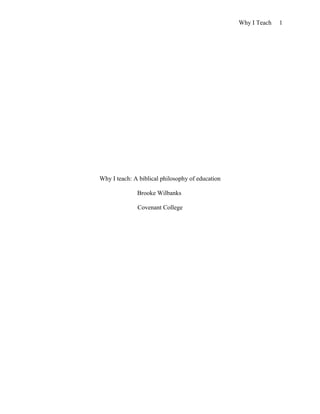
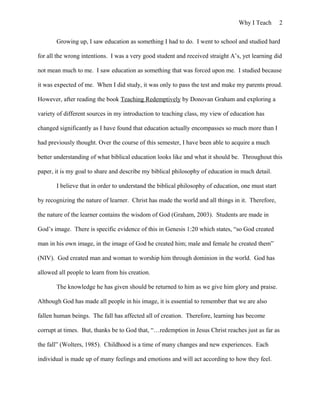
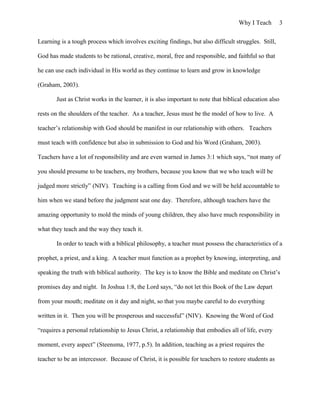

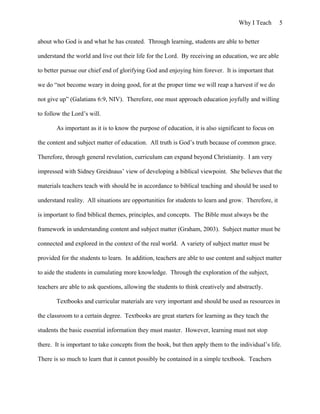
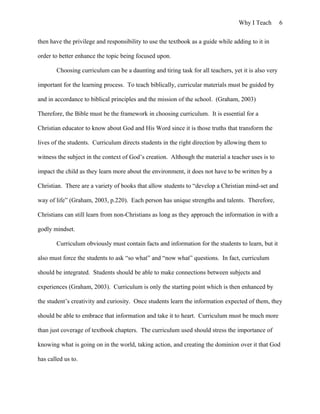
![Why I Teach 7
Just as curriculum is a significant subtopic in a biblical philosophy of education,
pedagogical methods are also essential to pay attention to. Humans are rational beings. We are
able to place events in our own framework, formulate ideas, and evaluate perceptions and events
(Graham, 2003). God has allowed each unique individual the ability to think and process
information in their own way. In fact, every classroom and situation is different because each
student is unique. According to Anthony Gregoric (1979), “learning style[s] consists of
distinctive behaviors which serve as indicators of how a person learns from and adapts to his
environment. It also gives clues as to how a person’s mind operates” (p. 234). There are many
different styles of learning. For example, Gregoric classifies learning into four categories
including concrete sequential, abstract sequential, concrete random, and abstract random.
Additional learning styles have been studied recently as well. According to data, most students
are either dynamic learners (35%) or common sense learners (35%). There are still others who
are imaginative learners (12%) and analytic learners (18%).
Since each individual perceives and orders information differently, it is crucial that a
teacher teaches to all styles of learning so that each student can achieve to the best of their
ability. The model of teaching styles which has been shown to be most successful over the years
is commonly known as Hoag’s ladder. This model describes which ways of learning are most
effective in student’s memory of the topic three days after it is taught. A teacher should know
how the students learn most effectively and Hoag’s ladder is a great help. Kaufmann (1996)
states, “the need to listen actively and constructively is crucial for [students] to succeed in their
work” (p.1). At the bottom of the ladder are passive ways of learning. These include hearing
and seeing. When students are engaged and actively participate through echoing and reciting, up
to 25% of the information is shown to be retained after three days. However, higher order](https://image.slidesharecdn.com/83a21771-b509-4b41-8e05-75433750f13c-160430183938/85/Teaching-Final-Paper-7-320.jpg)
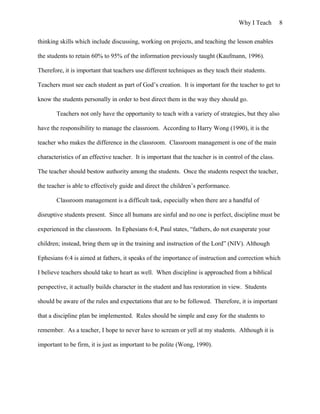
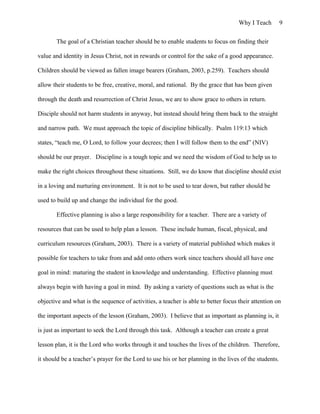
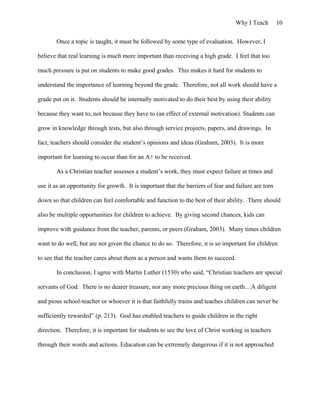
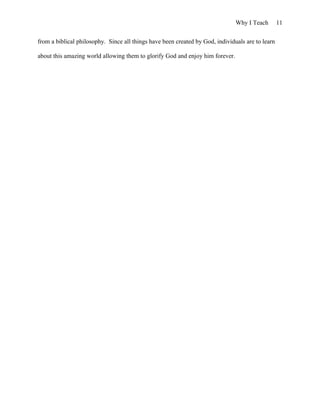
![Why I Teach 12
References
Block, A. A. (2008). Why should I be a teacher? Journal of Teacher Education. 59 (5), 416-427.
Fennema, J. (1978). Nurturing children in the Lord: a study guide for teachers on developing a
biblical approach to discipline. Phillipsburg: Presbyterian and Reformed Publishing Co.
Graham, D. L. (2003). Teaching Redemptivly. Colorado Springs: Purposeful Design
Publications.
Gregorc, A. F. (1979, January). Learning/teaching styles: potent forces behind them.
Educational Leadership, 234-236.
Holy Bible: New international version. (1984). Grand Rapids: Zondervan.
Kaufmann, S. (1996). Hoag’s ladder revisited. Sharing God’s World. 11 (19), 1.
Luther, M. (1953). A sermon on keeping children in school. Luther’s Works, 46, 213-257.
Steensma, G. J. (1977). Shaping school curriculum: a biblical view. Terre: Signal Publishing.
Wolters, A. M. (1985). Creation regained: biblical basics for a reformation worldview. Grand
Rapids: William B. Eerdmans Publishing Company.
Wong, H. A. (1990). The effective teacher [VHS Tape]. United States: Harry K. Wong
Publications, Inc.](https://image.slidesharecdn.com/83a21771-b509-4b41-8e05-75433750f13c-160430183938/85/Teaching-Final-Paper-12-320.jpg)